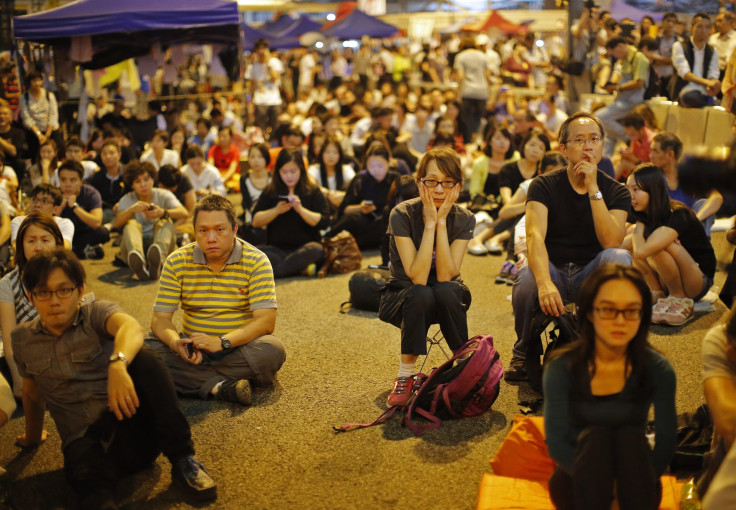Hong Kong Protests: Talks' Cancellation Breathes New Life Into Protests

Thursday night, hours after the Hong Kong government canceled meetings with student leaders scheduled for Friday, protesters, whose numbers had previously been dwindling, returned in larger numbers to the territory's Admiralty movement. And organizers are calling for further demonstrations on Friday.
Trey Menefee, a professor at Hong Kong Institute of Education, told International Business Times that students participating in the protests told him they had planned to pack up their things before the talks. "The talks were a face saver for both the government and the students," he said. "They were a token gesture at a moment when the students might have accepted a token."
After the cancellation, Ian Chan Kok-hin, external vice president of the Hong Kong Federation of Students, an organization that had planned to participate in talks on Friday, blasted the government as "insincere," according to South China Morning Post. "The government is forcing the students and citizens to continue this occupation," he said.
Carrie Lam, Hong Kong's chief secretary and the government's appointed negotiator, announced the cancellation at a press conference earlier Thursday evening, accusing the students of failing to meet "the basic conditions of dialogue." Student leaders have repeatedly called on Leung Chun-ying, Hong Kong's embattled chief executive, to resign, a demand that the government has refused to consider.
Although the Hong Kong government has blamed the protests' persistence on student intransigence, the announcement of the cancellation appeared to breathe new life into a protest movement that had noticeably thinned out throughout the city. Exhausted from days of demonstrations, many of the protesters had begun to resume their ordinarily lives in anticipation that the talks would bring resolution to Hong Kong's political crisis.
The cancellation was simply the latest instance in which the government has revived the protests just when the movement was losing momentum, Menefee said. Police use of tear gas against demonstrators on Sept. 28 swelled the number of participants throughout Admiralty, one of the original protest sites, while anti-protester violence by civilians in Mong Kok, a working-class neighborhood in Hong Kong's Kowloon district, sparked similar outrage.
"It's almost like the government wants the protesters to stay," said Menefee. "I don't know why they don't just ignore them and wait them out."
Sparking outrage among Hong Kong's protest leaders, many of whom renewed calls for Leung's resignation, was also a bribery scandal involving Leung, who became Hong Kong's chief executive in 2013. John Garnaut, a longtime China correspondent now based in Sydney, reported on Wednesday that Leung received undisclosed payments worth up to $6.5 million from UGL, an Australian engineering firm.
Cam MacMurchy, an independent consultant based in Hong Kong, told IBTimes that the territory's government has little experience managing serious crises on multiple fronts and may be prone to overreaction and miscalculation.
"The government, police and protesters are all feeling this out as they go," he said. "This kind of thing doesn't usually happen in Hong Kong."
© Copyright IBTimes 2024. All rights reserved.






















